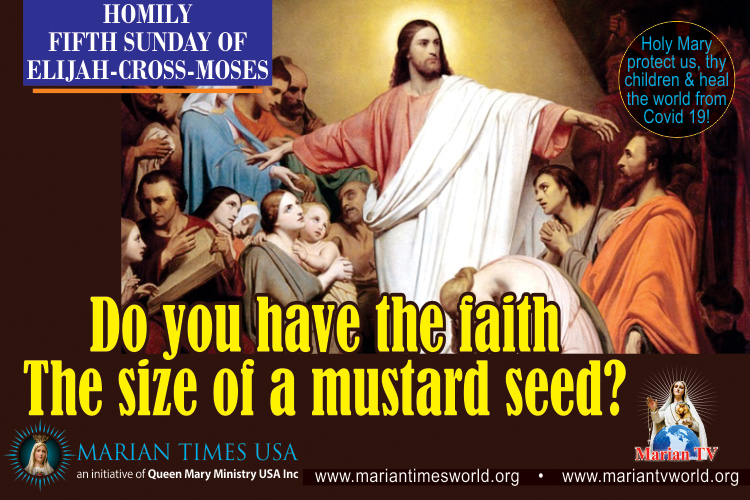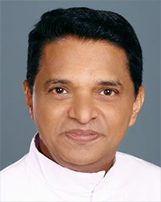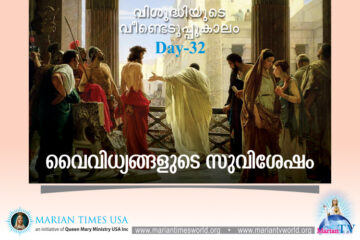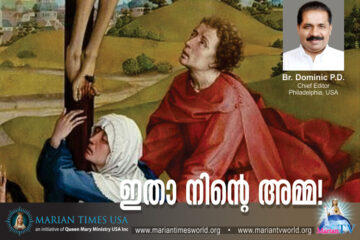DO YOU HAVE THE FAITH THE SIZE OF A MUSTARD SEED?


Fr. Abraham Mutholath,
Chicago, USA.
HOMILY FIFTH SUNDAY OF ELIJAH – CROSS – MOSES
INTRODUCTION
Though Jesus had given power to the 12 apostles to cast out demons, nine of them failed in casting out demon from a boy while Jesus was transfigured on a high mountain in the presence of the apostles Peter, James, and John. When Jesus, along with the three came down, he healed the boy. When the nine asked Jesus why they could not do it, he explained that in such severe cases special preparation like prayer and fasting are needed. Faith is also demanded from the disciple and the recipient of the miracle. Let us ask God to increase our faith and help to supplement it from our part with prayer and fasting as Jesus taught us through his disciples.
The Bible Text
Matthew 17:14-21
The Healing of a Boy with a Demon.
(14) When they came to the crowd a man approached, knelt down before him, (15) and said, “Lord, have pity on my son, for he is a lunatic and suffers severely; often he falls into fire, and often into water. (16) I brought him to your disciples, but they could not cure him.” (17) Jesus said in reply, “O faithless and perverse generation, how long will I be with you? How long will I endure you? Bring him here to me.” (18) Jesus rebuked him and the demon came out of him, and from that hour the boy was cured. (19) Then the disciples approached Jesus in private and said, “Why could we not drive it out?” (20) He said to them, “Because of your little faith. Amen, I say to you, if you have faith the size of a mustard seed, you will say to this mountain, ‘Move from here to there,’ and it will move. Nothing will be impossible for you.” (21) But this kind does not go out except by prayer and fasting.
Interpretation
The fact that this incident is reported in the three synoptic gospels shows the importance of the message this had in the early church (Mark 9:14-29; Luke 9:37-42). All the three gospels present this as it happened when Jesus, along with Peter, James, and John, was coming down the mountain after the transfiguration experience.
(14) When they came to the crowd a man approached, knelt down before him,
When they came to the crowd
Matthew gives a summarized statement of transition of Jesus and the three apostles from the mountain of transfiguration to the dialogue between Jesus and the father of the boy with a demon. Luke states that the team came from the mountain on the next day of transfiguration. This must be because the transfiguration had happened at night. That might be another reason for Peter suggesting making three tents for Jesus, Moses, and Elijah for their stay on the mountain top (Matthew 17:4).Mark adds that they came down to the other disciples who were waiting there along with a large crowd. The scribes were arguing with the disciples. When Jesus asked, “What are you arguing about with them?” (Mark 7:16), the answer came from the father of the child with the demon. So, the argument wason the failure of the disciples in healing the boy in the name of Jesus. The Scribes were discrediting Jesus for the lack of cure in Jesus’ name and were questioning the poor disciples on their faith in Jesus as the Messiah.
This event reminds us of the Mount Sinai experience of Moses and the sin of golden calf under the leadership of Aaron. During the prolonged absence of Moses, people insisted on Aaron saying: “Come, make us a god who will go before us; as for that man Moses who brought us out of the land of Egypt, we do not know what has happened to him.” (Exodus 32:1). Their impatience and lack of faith in God and Moses brought them punishment. A similar situation might have happened here. Like Aaron and the large crowd of Israelites waiting at the base of Mount Sinai, the nine disciples of Jesus were patiently waiting for Jesus and the three privileged disciples. The crowd that came to see Jesus was also with the nine. They might have felt bad because they were not allowed to follow Jesus to the mountain top with the other three. They were even feeling crisis in their faith that led to their inability to perform the healing in the name of Jesus. They might have attempted to heal the sick child trusting in the power of their own words rather than the power of Jesus. The Scribes have been questioning their inability to heal the boy and insulting them and Jesus.
A man approached
The father of this demoniac boy was much distressed by the inability of healing by the nine apostles. That must be the first failure of the apostles. So, the father was disappointed and earnestly approached Jesus from the crowd. His only hope was in Jesus.
Knelt down before him
Kneeling is a posture of reverence and worship. The Hebrews considered knee as a symbol of strength. So, bending the knee represents one’s surrender before the Almighty. At the dedication of the Temple of Jerusalem, King “Solomon knelt in the presence of the whole assembly of Israel and stretched forth his hands toward heaven.” (2 Chronicles 6:13). After return to Jerusalem from Babylonian exile, Ezra’s posture of prayer was in a similar fashion: “Then, at the time of the evening sacrifice, I rose in my wretchedness, and with cloak and mantle torn I fell on my knees, stretching out my hands to the LORD, my God.” (Ezra 9:5). During the public ministry of Jesus, many people who sought his help knelt before him as sign of their devotion. Jesus himself prayed on his knees at the Garden of Gethsemane before his passion and crucifixion (Luke 22:41). St. Stephen (Acts 7:60), St. Peter (Acts 9:40), St. Paul (Acts 20:36) and the early Christian Community (Acts 21:5) used to pray on their knees. So, kneeling is a biblical posture of prayer and surrender before God.
(15) and said, “Lord, have pity on my son, for he is a lunatic and suffers severely; often he falls into fire, and often into water.
Lunatic
The term lunatic is from the Latin word lunaticus, which means moon. Its equivalent word in English is “moonstruck.” People with mental disorder who are believed to have aggravated symptoms during full moon were classified as lunatic. They were distinct from demon possessed. Most of them are epileptic. Astrologers had used this term to refer to neurological and psychiatric diseases. They believed that the moon could disturb the brain. In the olden days people, who were sleeping in the open air without any shelter,used to keep awake because of the intense light of the full moon. That would affect the health and behavior of a mentally sick person. Other than this, there is no scientific evidence for the full moon’s influence on human behavior.
Suffers severely; often he falls into fire, and often into water.
In the gospel of Matthew, the father gives only a summary of the sickness by stating that his son suffered severely and fell into fire or water.The epilepsy or “falling sickness” make the person uncontrollable from falling when the seizure happened regardless of whether he was at the fireside, or by the water, or in any similar dangerous state. Some interpreters present that the son had a suicidal tendencybecause of his severe suffering from the sickness. In Mark, the father states that the son was “possessed by a mute spirit. Wherever it seizes him, it throws him down; he foams at the mouth, grinds his teeth, and becomes rigid.” (Mark 9:17-18). These were the normal symptoms of epilepsy or seizure the son had, though the belief was that it was because of the influence of an evil spirit. In Luke, the father made the request more sensitive by saying that the sick son was his only child. Here also the father believes that the son was possessed by a demon and describes the symptoms. “For a spirit seizes him and he suddenly screams and it convulses him until he foams at the mouth; it releases him only with difficulty, wearing him out.” (Luke 9:39). All these show that the condition of the boy was severe and needed a divine intervention to cure.
(16) I brought him to your disciples, but they could not cure him.”
The topic of argument among the nine apostles and the Scribes was the inability of the apostles to cure the boy in the name of Jesus. The formula the apostles used to cure, as they had done before, did not work. It was a disgrace for them in front of the public followed by the ridicule of the Scribes on their master’s divine power. Jesus had previously given them “authority over unclean spirits to drive them out and to cure every disease and every illness.” (Matthew 10:1). They could successfully perform these miracles and had gladly reported it to Jesus (Luke 10:17). That experience had prompted the father to present his sick son to the apostles in the long absence of Jesus on the mountain with the other three apostles. But that attempt had failed. So, the father’s appeal could mean the inability of the disciples and the severity of the disease that could need a higher intervention from Jesus himself. The miracle did not happen at the attempts of the apostles was also attributed to the lack of full faith of the father in the healing power of Jesus. Unlike many other people who had approached Jesus for healing, this father’s request to Jesus was, “if you can do anything, have compassion on us and help us.” (Mark 9:22).
(17) Jesus said in reply, “O faithless and perverse generation, how long will I be with you? How long will I endure you? Bring him here to me.”
O faithless and perverse generation
Jesus’ reply was to all who were present especially the disciples and the father who were of little faith. The Scribes who were arguing had no faith at all in Jesus. Faith is a condition for miracle to work like the patients who need trust in their physician. The grace of God demands our faith in God. Jesus calls the people perverse or stubborn in their unbelief.
How long will I be with you?
The physical presence of Jesus was only for a limited time. The disciples had to continue the mission of Jesus. For that, they needed to remain in faith. This failure in performing the miracle was a learning experience for the nine apostles.
How long will I endure you?
God had been enduring the constant unfaithfulness of Israel throughout its history despite God’s covenant with them and the protection they enjoyed from God. This question must have been addressed not to the disciples but to the whole Israel.
Bring him here to me.
This request was to the father of the sick child because in Luke’s version, the words of Jesus was “Bring your son here.” (Luke 9:41). Instead of Jesus walking towards the sick, he asked the father to bring the child to him to test his faith in the healing power of Jesus.
(18) Jesus rebuked him and the demon came out of him, and from that hour the boy was cured.
Jews had believed that many diseases were caused by demons. The sickness of this boy was complicated and had the symptoms of a combination of epilepsy and possession by demon. That was why Jesus scolded the demon and cast it out from the boy.
Matthew gives a summary of the cure. However, Mark gives more details of how it happened(Mark 9:20-27). According to him, the father and others brought the boy to Jesus. Then the demon threw the boy into convulsions. The boy fell to the ground, rolled around with foam coming out of his mouth. When Jesus enquired the father the history of the illness, he said that the boy had that sickness from childhood. The father made a mistake in requesting Jesus: “But if you can do anything, have compassion on us and help us.” (Mark 9: 22b). The father was probably losing his hope in getting the cure because of the failure of the nine apostles and because of the severe symptoms repeated even in the presence of Jesus. When Jesus questioned the father’s doubt, the father cried out saying: “I do believe, help my unbelief!” (Mark 9:24). That was the key to get the cure. Jesus empowered the father’s faith and gave complete cure to the boy. However, some more actions took place testing the faith of the father. When Jesus commanded the demon to come out of the boy and never enter him again, the boy had convulsions again while the demon left. The boy was lying down like a corpse and many gathered there believed that he was dead. The father did not respond because still he had faith in Jesus. Jesus raised the boy by hand.
Though Luke also gives only a summary of how Jesus healed the boy, the evangelist adds that Jesus returned the boy to his father after the healing. All the bystanders were “astonished by the majesty of God.” (Luke 9:42).
(19) Then the disciples approached Jesus in private and said, “Why could we not drive it out?”
The disciples approached Jesus in private
The nine who failed to perform the miracle in the name of Jesus were the disciples who approached Jesus in private. The disciples were reluctant to ask Jesus in public the reason for their failure to heal. They were sure that they did the way they had been doing before in such cases. They were humiliated in public and were questioned by the Scribes igniting their humiliation. According to Mark’s gospel, this question was raised at a house where Jesus and the disciples were staying (Mark 9:28).
(20) He said to them, “Because of your little faith. Amen, I say to you, if you have faith the size of a mustard seed, you will say to this mountain, ‘Move from here to there,’ and it will move. Nothing will be impossible for you.”
Because of your little faith
Jesus found deficiency of faith also among the disciples. The nine apostles showed some faith by attempting to perform the miracle in the name of Jesus. But they had doubts on their master’s behavior. They were discouraged because Jesus avoided them when he went to the mountain for prayer. They were not sure what was happening there with the other three favored disciples. So, their faith in Jesus began to fade.
If you have faith the size of a mustard seed
This phrase does not mean that they need only tiny faith like a mustard seed. It shows the contrast of a great impact they could make even if they had only little faith in Jesus. Even a mustard seed that would seem insignificant can grow as a big tree. So also, their faith in Jesus could grow and produce great impact in the world. And it in fact happened in the history of the church.
Say to this mountain, ‘Move from here to there,’ and it will move.
Jesus just came down from the MountTabor (or Mount Hermonas some believe) with Peter, James and John after the transfiguration. So, Jesus might be pointing to the same mountain when he told this. Moving the mountain is not to be taken in a literal sense. Jesus was using an oratorial magnification to make the point that what would seem humanly impossible could be achieved when done in faith.
Nothing will be impossible for you.
Everything is possible for God. When the church was under severe persecution from the Romans for centuries, the Christian community had no idea how that could be ended. In faith and prayer, they persisted in the church. God made use of Emperor Constantine to end the Christian persecution and to promote Christianity all over the Roman empire. So, when the disciples perform anything that is concurrent with the will of God, thatshall be done, provided they do that with faith.
(21) But this kind does not go out except by prayer and fasting.
There can be varying degree of demons and their attacks on persons (Matthew 12:45). The expulsion of the demon Jesus performed was a severe case. That was why Jesus used “this kind” which needed a strong spiritual power that could be attained by prayer and fasting. Jesus could gain strength in preparation for his public ministry by prayer and fasting for 40 days and nights (Matthew 4:2). Before receiving the tablets of 10 commandments from God, Moses was with God 40 days and 40 nights (Exodus 24:18). He repeated this prayer and fasting for 40 days and nights before writing down the two tablets of the 10 commandments on Mount Sinai (Exodus 34:28). The disciples had not been fasting during the public ministry of Jesus (Matthew 9:14). They were not sure how to pray (Luke 11:1). So, Jesus was helping his disciples to understand how they should overcome difficult tasks in their ministry.
Message
- Like the father in this gospel passage, parents should intercede for the spiritual wellbeing and safety of their children. Jesus will answer their prayers when done in faith and fasting. Children are prone to many moral, spiritual and physical dangerous situations.
- The father of the sick child prayed to Jesus on his knees. Kneeling is symbolic of surrendering ourselves at the power of God than relying on ourselves. It is the best position of prayer according to the Bible.
- Faith is a gift of God. Let us be thankful to the Lord for the faith we have received through our parents and our church. Following the example of the apostles, let us also ask Jesus to increase our faith (Luke 17:5).
- When the nine apostles failed in their ministry in public and humiliated by the Scribes, they did not leave Jesus but tried to learn from him by asking for clarification in private. Let us not get disappointed when failures happen in our ministry.
- Impossible things happened in the history of the church by humble and persistent Christians like St. John Maria Vianney, Father Damien, Mother Theresa, Pope Pius X, Pope John XXII and many others. When we start doing the works for God and His people, God will make us instruments of doing the ordinarily impossible. It would be like moving the mountain from one place to another.
മരിയന് ടൈംസിലെ ഇന്നത്തെ പ്രധാനപ്പെട്ട അപ്ഡേറ്റുകള് താഴെ ലഭിക്കുന്നതാണ്.









